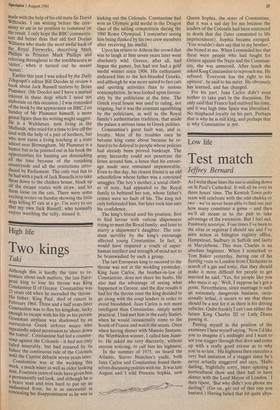High life
Two kings
Taki
Although this is hardly the tinie to reminisce about such matters, the last European king to lose his throne was King Constantine II of Greece. Constantine was 23 years old when he ascended the throne. His father, King Paul, died of cancer in February 1964. Three and a half years later Constantine was to flee his kingdom, lucky enough to escape with his life as his private Grumman airplane was shadowed by an overzealous Greek airforce major who repeatedly asked permission to 'shoot down the traitor'. Constantine had led a countercoup against the Colonels — it had not only failed miserably, but had ensured by its failure the continuous rule of the Colonels until the Cypriot debacle seven years later. Constantine was at the wedding this week, a much wiser as well as older looking man. Fourteen years of exile have given him a permanently sad look, and although he is a brave man and tries hard to put up an undaunted front, he is as successful at concealing his disappointment as he was in kicking out the Colonels. Constantine had won an Olympic gold medal in the Dragon class of the sailing competition during the 1960 Rome Olympiad. I remember seeing him being dunked by his two crew members after receiving his medal.
Upon his return to Athens the crowd that was to laugh at him seven years later went absolutely wild. Greece, after all, had begun the games, but had not had a gold medal winner since 1906. His enthusiasm endeared him to the hot-blooded Greeks, and although he was more suited to fast cars and sporting activities than to serious contemplation, he was looked upon favourably by the politicians at the time. The Greek royal house was used to ruling, not reigning, but it was the constant squabbling by the politicians, as well as the Royal family's authoritarian tradition, that made the palace a serious issue in Greek politics.
Constantine's great fault was, and is, loyalty. Most of his troubles once he became king came about because he refused to be disloyal to people whose policies had already been proved bankrupt. The army hierarchy could not penetrate the fence around him, a fence that his entourage made sure remained impenetrable. Even to this day, his closest friend is an old schoolfellow whose father was a convicted smuggler.The boy's mother, a social climber of note, had appealed to the Royal family to befriend her son, whose father's crimes were no fault of his. The king not only befriended him, but later took him into his confidence.
The king's friend used his position, first to find favour with various shipowners trying to meet the Royal family, and later to marry a shipowner's daughter. The constant servility by the king's entourage affected young Constantine. In fact, it would have required a youth of superhuman intellect and strength of mind not to be brainwashed by such a group.
The last European king to succeed to the throne was not at the wedding yesterday. King Juan Carlos, the brother-in-law of Constantine, does not share his faults. He also had the advantage of seeing what happened in Greece, and the dire results it had for the throne once the king decided to go along with the coup leaders in order to avoid bloodshed. Juan Carlos is not more intelligent than Constantine, simply more practical. I had met him in the early Sixties, when he would occasionally come to the South of France and watch the tennis. Once when having dinner with Manolo Santana, the Wimbledon winner, I called him Juani to. He asked me very discreetly, without anyone noticing, to call him his highness. In the summer of 1975, on board the Atlantis, Stavro Niarchos's yacht, both Juan Carlos and Constantine found themselves discussing politics with me. It was late August and I told Princess Sophia, now Queen Sophia, the sister of Constantine, that it was a sad day for me because the leaders of the Colonels had been sentenced to death that day (later commuted to life imprisonment). Sophia became enraged. 'You wouldn't dare say that to my brother,' she hissed at me. When I reminded her that these were people who had fought for Greece against the Nazis and the Communists, she was unmoved. After lunch she asked King Constantine to reproach me. He refused: 'Everyone has the right to his opinion', he said to his sister. He obviously has learned, and has changed.
For his part, Juan Carlos didn't even bother to take part in the discussion. He only said that Franco had outlived his time, and it was high time Spain was liberalised. No misplaced loyalty on his part. Perhaps that is why he is still king, and perhaps that is why Constantine is not.


































 Previous page
Previous page